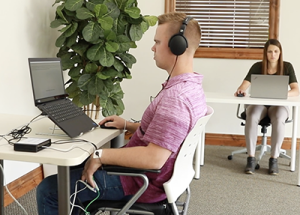Converus Participates in American Polygraph Association Committee to Establish a New EDA Standard
EyeDetect+ is the world’s first automated polygraph. Tests are administered and scored by computer, assuring the process is impartial and fair to all examinees.

Since EyeDetect+ meets the new APA EDA standard, Converus is hopeful more examiners will consider using this new, automated technology.
LEHI, Utah – Sept. 26, 2023 – The world’s first automated polygraph, EyeDetect+ by Converus, meets the American Polygraph Association’s (APA) newly adopted electrodermal activity (EDA) signal processing standard. Converus participated in the APA committee to establish the EDA standard, which assures consistent utilization and display of an EDA signal data across different polygraph field testing instruments produced by various manufacturers. The new standard was adopted by the APA Board in the August board meeting and published to APA membership last Aug. 27.
In the Polygraph & Forensic Credibility Assessment journal article, “An EDA Primer for American Polygraph Associations” (Handler, M., Nelson, R., Krapohl, D., and Honts, C.R.) it indicates the electrodermal response “is the most robust and informative” of all the data collected and analyzed during a polygraph test.
“For polygraph examiners looking for an automated testing option, it was important that EyeDetect+ met the EDA standard established by the APA,” said Converus President and CEO Todd Mickelsen. “We hope more credibility experts will now consider this new technology.”
The first modern-day analog polygraph was invented in 1921. In 1991, scientists John Kircher and David Raskin co-invented the computerized polygraph, the first substantial improvement to polygraph technology in many decades. In 2021, Converus announced EyeDetect+, the world’s first automated polygraph.
EyeDetect+ monitors and records similar physiological activity as a traditional polygraph and adds the ocular data from the standard EyeDetect test. Unlike the traditional polygraph, EyeDetect+ is less intrusive because it replaces the blood pressure cuff — which Mickelsen says can become extremely uncomfortable when contracted for long periods of time — with small sensors attached to both wrists. The polygraph’s pneumatic tubes have also been replaced by less intrusive sensors. According to Mickelsen, credibility assessment experts praise this innovation.
At the conclusion of an EyeDetect+ test, the data collected are analyzed within five minutes by an advanced algorithm, generating a credibility score to indicate if the person was deceptive or credible. Examiners still have the option to manually score the polygraph channel data.
“The EyeDetect+ automation increases the reliability, objectivity and speed of the polygraph testing process, which helps assure an impartial and honest determination of the examinee’s innocence or guilt,” said Kircher, who is also co-inventor of EyeDetect and currently the chief scientist at Converus.
For more information, visit: converus.com
# # #
About Converus®
Converus provides scientifically validated credibility assessment technologies. VerifEye™ is the world’s first mobile app to help organizations or individuals accurately verify the truth about a person — including background, identity, creditworthiness and claims — in about 10 minutes. EyeDetect®, which detects deception by measuring involuntary eye behavior, is a fast, accurate, affordable, noncontact, scalable, and fully automated option to polygraph. EyeDetect+ is the world’s first automated polygraph, making the testing process impartial, accurate, and less intrusive (than a traditional polygraph). It assesses credibility by monitoring and recording ocular activity plus physiological activity similar to a traditional polygraph. Customers worldwide use the EyeDetect product line for screening and investigations to help protect countries, corporations and communities from corruption, crime and threats. Converus is headquartered in Lehi, Utah, USA. Visit converus.com
______________________________________________________________________
Press Contact: Jeff Pizzino, APR (+1 480-606-8292 or [email protected])

